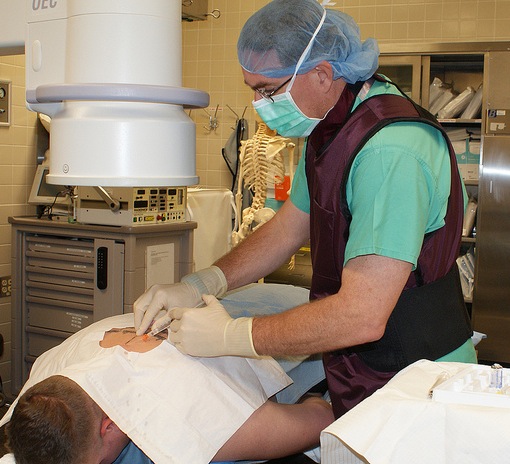The Centers for Disease Control confirmed Thursdau that tainted vials of a steroid from the Mass.-based compounding pharmacy, New England Compounding Center (NECC), are the source of the fungal infection that is responsible for the recent meningitis outbreak. The most recent death, Michigan, brings the nation’s total to 20.
Sixteen states have reported 257 infections: Florida, Idaho, Illinois, Indiana, Maryland, Michigan, Minnesota, New Hampshire, New Jersey, New York, North Carolina, Ohio, Pennsylvania, Tennessee, Texas and Virginia.
While no infections have been reported in Connecticut, the steroid was recalled from Interventional Spine and Sports Medicine in Middlebury. The Stamford Advocate reports that the 39 patients in the state who received the steroid were contacted. One patient experienced symptoms, but tested negative for meningitis.
According the CBS Evening News, the CDC has definitively linked a single drug to the outbreak. However, the Food and Drug Association (FDA) is following another patient who may have meningitis, whose back was treated with another injectable medication produced by NECC, which made hundreds of products before it was shut down.
The government is instructing doctors to contact all patients who have received any of the injectable medications made by the NECC, including steroids and drugs used for heart operations and eye surgery, according to NBC Connecticut.
“The CDC has never had to respond to such a rapidly spreading infection from a tainted medication,” said medical correspondent Dr. Jonathan Lapook on Thursday night’s “CBS Evening News with Scott Pelley.”
The CDC estimates that approximately 14,000 patients may have been exposed to preservative-free methylprednisolone acetate, through steroid injections used mainly for back pain. A week ago, the CDC said that more than 90 percent of the affected patients had been contacted.
There is concern that some infected patients may go unnoticed because this is a rare infection to which a large number of people have been exposed. Meningitis is an inflammation of the membranes surrounding the brain and spinal chord. Most cases of the meningitis are caused by bacteria. This latest outbreak is unique because it is a fungal infection.
“Given that fungal infections of this kind have never been seen before, the doctors caring for these patients are going to need guidance,” Dr John Jernigan, the epidemiologist leading the team investigating the meningitis outbreak, said in a press statement.
“The scope of this disaster, which only increases by the day — is a call to action for increased federal oversight of these unauthorized drug manufacturers masquerading as compounding pharmacies,” said Sen. Richard Blumenthal (D-CT). On Monday, he wrote the commissioner of the FDA, asking for stricter government oversight of compounding pharmacies like the NECC, which often make drugs in large quantities without the same governmental regulation as pharmaceutical drug makers.
A compounding pharmacy can produce drugs that are not easily available commercially, for instance a drug in short supply or no longer on the market due to low commercial use. Created for a specific patient, a drug can be turned from a solid to a liquid for easier consumption, made without dye or preservatives for one with an allergy, or formulated to the exact dose needed. Compounding pharmacies are regulated by state industries, and some of the larger ones are accused of acting like drug companies while circumventing FDA regulations.
Rep. Rosa DeLauro (D-CT) also attributed regulatory chaos to causing the meningitis outbreak. She supports an ongoing federal investigation of NECC.
“Conducting a thorough investigation so we can get to the bottom of why a compounding pharmacy acted as a manufacturer and was able to sell contaminated product in more than twenty states is imperative,” she said in a press release on Wednesday.“The federal government has the responsibility to ensure this failed patchwork of regulations is corrected. Congress must act to ensure this does not happen again.”

Leave a Reply